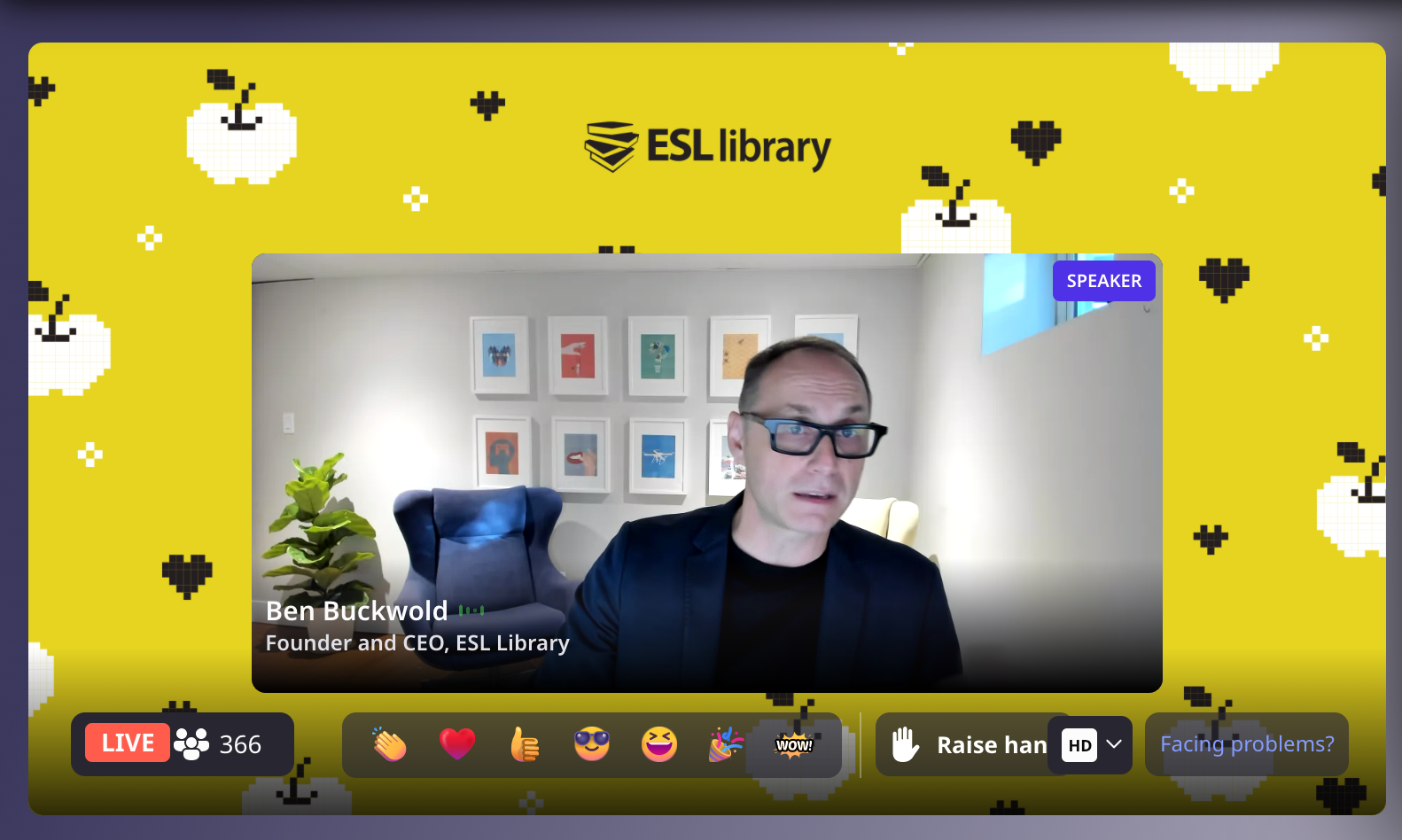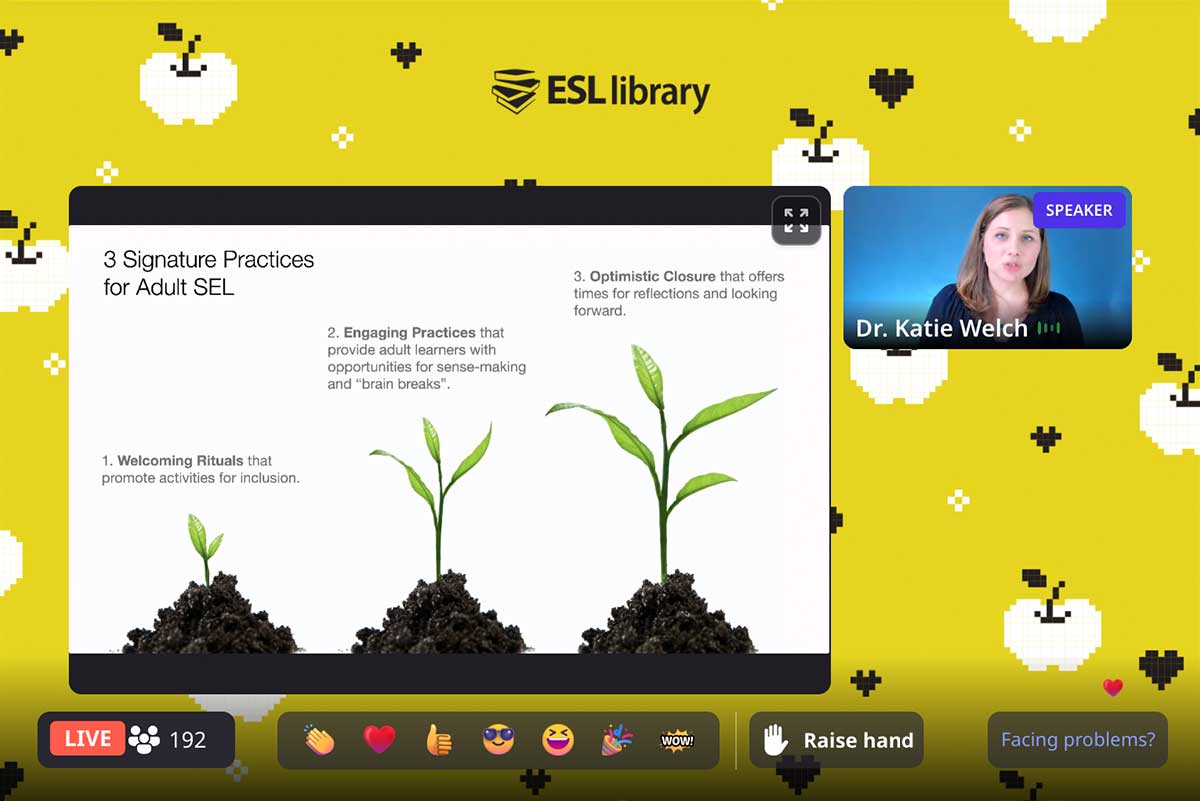Our first-ever ESL Library Virtual Conference took place September 17–18 with 800+ attendees from more than 81 countries. The theme for our inaugural event was Empowering Teachers in the Digital Age.
As per tradition, I always try to make time for a post-conference reflection with a few highlights and takeaways. I love having a summary to look back on as well as something to share with those who were unable to attend.
3 Highlights
1. Social Networking
Improving communication around the world has always been ESL Library's core mission. Based on the feedback we've received about the conference, it's safe to say that attendees, speakers, and ESL Library staff all appreciated the opportunity to connect in this welcoming space at this challenging time.
We used the chat, the Q&A, raised hands, direct messages, speed networking, and virtual theme-based tables to check in and learn from each other. There was an overwhelming feeling of positivity and optimism that I think we've all been craving. Did you feel it?
2. Speakers
Our invited speakers and ESL Library staff covered a wide range of topics including publishing trends, blended learning, the flipped classroom, social-emotional health, assessment, and the rise of EdTech.
We were grateful to learn from Russell Stanndard (Teacher Training Videos), Fely García López (Flipgrid), Dr. Katie Welch (Welch Education), Robyn Lockwood (Stanford University), and Dr. Meg Malone (ACTFL).
Our CEO, Ben Buckwold, also shared behind-the-scenes stories and industry insight while our conference host, Tammy Wik, led demonstrations of our own platform and features, including an interactive flashcard workshop that left us all bursting with ideas. Representatives from our Publishing team (Ann, Tanya, and Tara) also enjoyed leading our two morning Coffee Talks, where we chatted with attendees about the evolution of grammar materials and the importance of social-emotional health for teachers and learners.
3. Storytime
Our CEO, Ben—a natural storyteller—finally got the chance to share ESL Library's origin story. If you weren't able to hear it live, be sure to grab a coffee and watch the recording. While we listened to Ben, we admired the new art on his wall, courtesy of our talented in-house illustrators, featuring topics from our popular Discussion Starters section.

10 Takeaways
This was a single-strand conference, and it soon became clear that I couldn't miss a minute of it! After coffee breaks and social hours, attendees and speakers automatically bounced back into the next session, so it always felt inclusive and we got to know each other. Here are some of my top takeaways from the speaker sessions.
- Don’t feel you need to start class by taking up the homework. A pre-class task should be a springboard for the class activity. (Russell Stannard)
- According to language learners themselves, 85% of what they learn is from independent learning. Extramural learning is learning that takes place outside the walls (or screens) of a classroom and is not necessarily related to the class content. Let's encourage our learners to be active learners. (Russell Stanndard)
- The pandemic has inspired us to use tech differently, even now that some of us are back in a traditional classroom. We use tech for announcements, for sharing examples, for leaving live-time feedback, and for real-world speaking and writing practice. (Dr. Meg Malone)
- When it comes to assessment, it helps to find out what students' expectations are of themselves. Compare these to your expectations and consider meeting them in the middle. (Dr. Meg Malone)
- When creating your own Flipgrid prompt, try to incorporate the four domains (listening, writing, reading, and speaking). Don't forget to include lingustic supports. (Fely García López)
- Flipgrid's Discovery Partners make it easy to find useful content fast. They can also inspire you to get involved and create your own prompts. (Fely García López)
- Design Thinking (empathize, define, ideate, prototype, and test ), a trend teachers are grativating to, has a background in business. It shares a lot of elements of project-based learning, which focuses on a central question that the teacher chooses. (Robyn Lockwood)
- It's important for teachers to stay active in the industry in order to help publishers develop the materials students and teachers want and need. Teachers can raise their voices by joining local (e.g., TESL London) and international organizations (e.g., TESOL or ACTFL). Join a SIG and get active on a social channel, such as LinkedIn. (Robyn Lockwood)
- Social-emotional learning is not just about the skills we teach. It's also about the educational culture and setting. (Dr. Katie Welch)
- Provide students with alternative sentence stems to "I don't know," such as "May I have more time to think?, May I ask a friend for help?, I'm not sure about that, but I can tell you...". (Dr. Katie Welch)

Related Resources
Looking for recordings of our sessions? The recorded sessions from the ESL Library Virtual Conference are now available!
Summary
At a conference follow-up meeting with the organizers and staff, we all came away with a similar feeling. Our first-ever ESL Library Virtual Conference turned out to be much more than any of us expected. With virtually no technical glitches to worry about, our organizers and moderators were able to ensure that everything ran smoothly. The speakers were all well prepared and the attendees were extremely engaged. In fact, so many ideas were shared, we don't know where to start!
Thank you to Airmeet for a great platform, and thank you to all of the speakers, organizers, staff, and attendees for helping make this event such an enriching and uplifting experience. We hope you feel empowered to go out and do your best work and also to take care of yourself and your students! And yes, we will do this again!

Comments
Did you attend our first-ever ESL Library Virtual Conference? If yes, you're part of the history books! Please share a highlight or takeaway in the comments.


